Dogs are animals that largely depend on our care and love. Unfortunately, there are more and more sad stories about abandoned dogs and strays that are condemned to fend for themselves on the streets of big cities.
However, there are also those heartwarming moments when good people take matters into their own hands and do everything to help these helpless creatures.
One Good Samaritan went to the park every day to feed a poor doggo, doing the greatest good deed.
But, the most touching moment of the story was just about to happen.
Taking Care Of The Little Ones
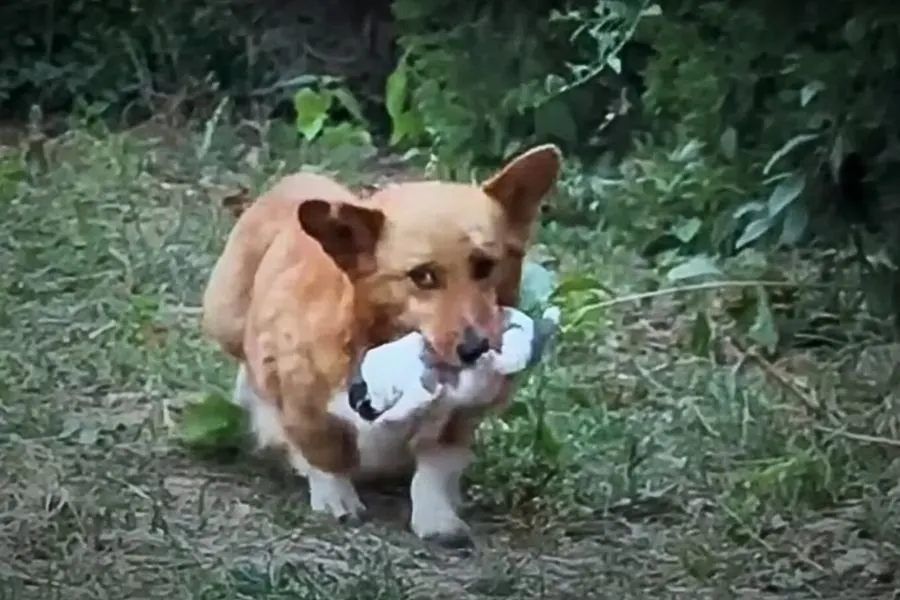
After feeding her a few times, this dog suddenly appeared from behind a bush carrying her little puppy. Just like any mother would do for her child, to this mama dog, the life of her baby was most precious, and it was obvious that she was asking him to help her.
The good man immediately understood what it was all about and decided to follow her. When he got to the place, he saw a big sofa, under which, a mother and her three puppies lived.
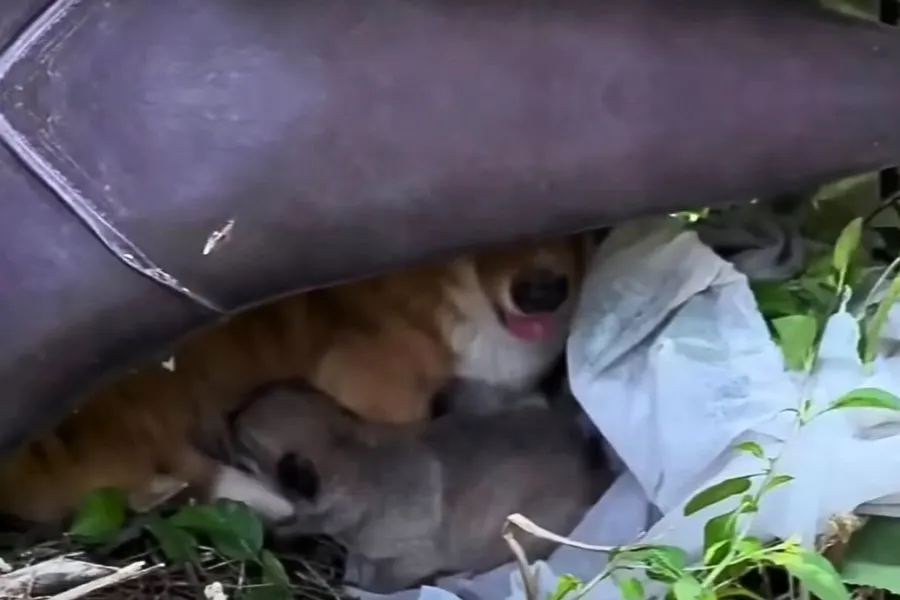
It was a truly heartbreaking scene that he could not remain immune to, and immediately decided to do something about it.
He brought a cage with him and slowly took one puppy after another in his arms. Although at that moment, the smile disappeared from the face of this brave mother, she quickly realized that this human had the best intentions.
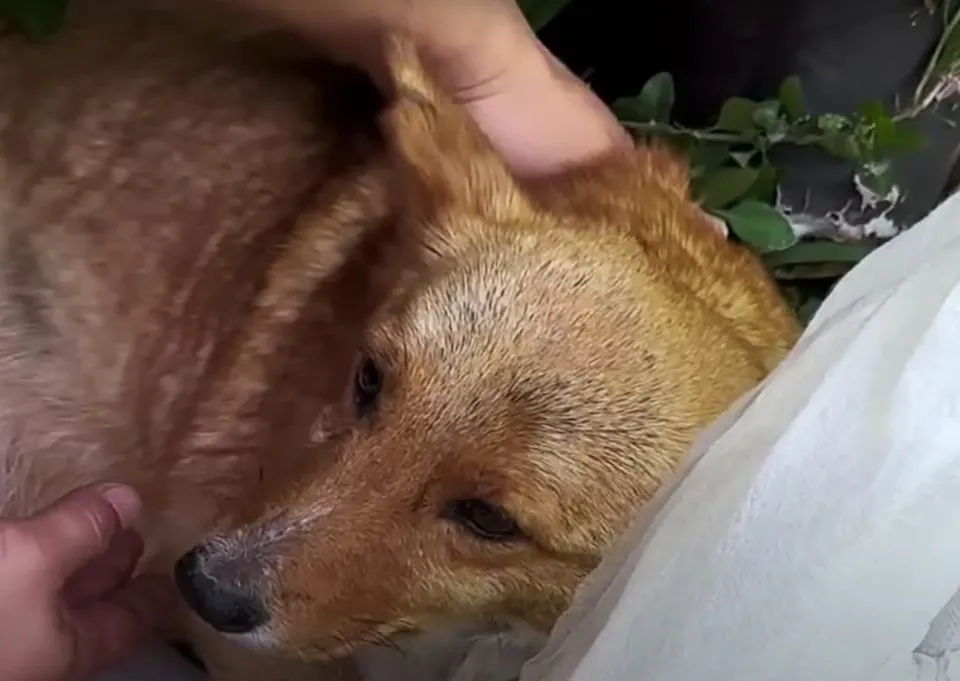
When all three babies were in the cage, he gently took the mom in his arms as well and placed her with her little loved ones.
Her face immediately returned to a soft smile full of joy because she knew that her little family would finally be safe.
Pure Mother Love
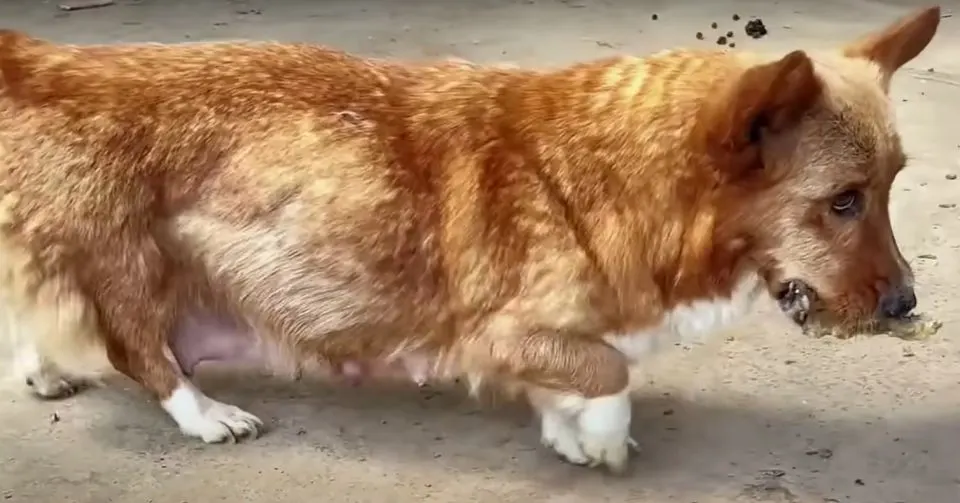
This man brought the mom and her puppies into his house where many other dogs also found their refuge. He made sure that they felt completely at home and that nothing was missing.
But, he made one “mistake”. As soon as they arrived, he filled a bowl with dog food, and thinking he was doing the right thing, placed it in front of the mama dog to satisfy her hunger.
She reluctantly took a few small bites at first. After that, she bit a large piece of food, but did not swallow it. Just as at the beginning of this story, she put the needs of her babies before her own, so she didn’t care much about her hunger.
Instead, with her mouth full, she made her way through a crowd in the rooms where there were many other dogs to finally reach the cage where her little ones were.
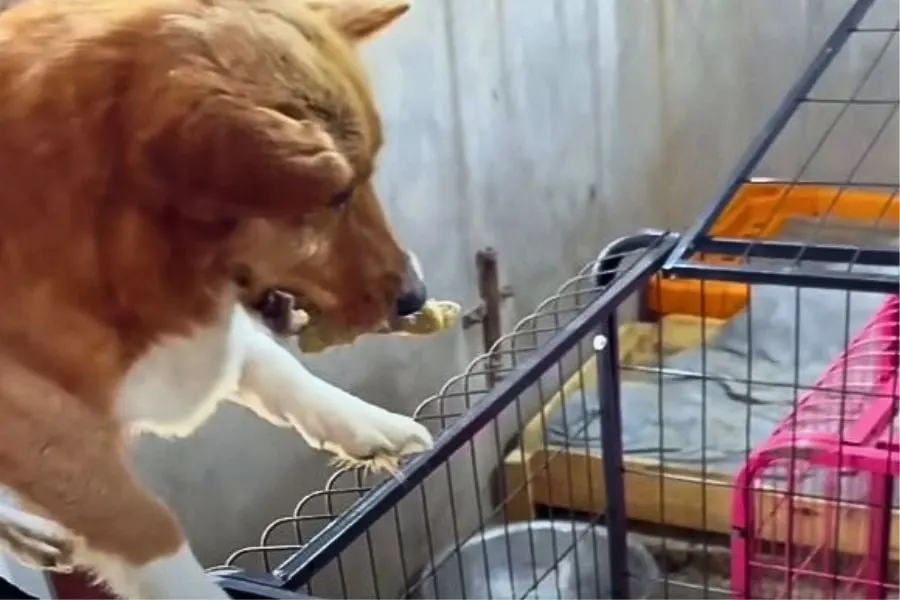
One by one, she fed all of her babies, and just like the first time, the smile returned to her face immediately. It was pure love – one that only a mother can give to her children.
In the end, this wonderful story showed us that true love, be it from a mother to her children or from a man to his best furry friend, can really lead to the most beautiful moments.
If you’ve ever caught your furry friend munching on their own feces, you’re not alone in wondering about this peculiar behavior. Dogs eating their poop, also known as coprophagia, can leave many pet owners scratching their heads in confusion. As a seasoned dog trainer, I’ve seen my fair share of dogs indulging in this less-than-appetizing habit. It’s a topic that often raises eyebrows and prompts a mix of curiosity and concern among dog lovers like yourself.
While it may seem baffling or even gross to us, there are various reasons why dogs engage in this behavior. Understanding the potential motivations behind coprophagia can shed light on your canine companion’s actions and help you navigate this common but perplexing aspect of dog behavior. So, if you’ve ever pondered why dogs have a penchant for poop, stay tuned as we unravel the mystery behind this curious canine habit.
Understanding Coprophagia in Dogs
The Definition and Frequency
Coprophagia, the scientific term for dogs eating their own feces, is a behavior that perplexes many dog owners. Despite appearing gross and unnatural to humans, this behavior is relatively common among dogs, with up to 16% of dogs reportedly engaging in coprophagia at some point in their lives.
The Different Types of Poop-Eating Behavior
There are different reasons why dogs may engage in coprophagia. Some dogs eat their own feces, while others may consume the excrement of other animals or even their fellow canines. Nutritional deficiencies, behavioral issues, medical conditions, or simply the natural instinct from their ancestors can all play a role in this behavior. Understanding the specific motivations behind your dog’s coprophagia can help you address and manage this curious habit effectively.
In Summary: Coprophagia, though puzzling to pet owners, is a fairly common behavior in dogs. By recognizing the potential reasons behind this habit, such as nutritional needs or instinctual behaviors, you can take steps to manage and address your dog’s coprophagia effectively.
Reasons Dogs May Eat Their Poop
Nutritional Deficiencies
Dogs might eat their poop due to lacking essential nutrients in their diet. When their food doesn’t provide all the necessary vitamins and minerals, dogs may try to re-consume their feces to make up for these deficiencies.
Health-Related Causes
Certain medical conditions can lead dogs to eat their own waste. Issues like malabsorption disorders or parasites in the digestive system can cause a dog to engage in coprophagia as a response to an underlying health problem.
Behavioral Reasons
Behavioral reasons, such as stress, anxiety, or boredom, can prompt dogs to eat feces. Dogs may exhibit this behavior as a coping mechanism or out of curiosity, especially in confined spaces or when left alone for long periods without stimulation.
Environmental Factors
The environment in which a dog lives can also influence coprophagia. For instance, if a dog is kept in an unclean or overcrowded space, they may be more inclined to consume feces. Lack of proper sanitation or exposure to the behavior from other dogs can contribute to this habit.
Remember, if you notice your dog engaging in coprophagia frequently, it’s essential to consult with a veterinarian to rule out any underlying health issues and work on behavioral modifications to address this behavior effectively.
Health Risks of Poop Eating in Dogs
Potential Parasites and Diseases
Eating poop can expose your dog to parasites like worms and infectious diseases. These parasites and diseases can be harmful to your dog’s health and might require medical treatment. It’s essential to prevent your dog from consuming feces to avoid these risks.
Impact on Human Health
If your dog eats poop, there is a risk of transmitting parasites or diseases to humans. This can pose a health hazard to you and your family members. Ensuring that your dog doesn’t engage in coprophagia is crucial for maintaining a safe environment for everyone in your household.
Preventing and Stopping the Habit
Training and Behavior Modification
If your dog is eating poop, training and behavior modification techniques can help deter this behavior. Start by teaching the “leave it” and “drop it” commands. When your dog shows interest in feces, use these commands to redirect their focus. Consistency is key – reward them for obeying and be patient as changing habits takes time. Additionally, keep your dog mentally stimulated and physically active to prevent boredom, which can lead to coprophagia.
Dietary Changes and Supplements
Adjusting your dog’s diet can also aid in preventing poop-eating. Ensure your dog is receiving a balanced diet rich in essential nutrients. Consider adding probiotics to promote a healthy gut flora, as imbalances can contribute to coprophagia. Increase fiber intake with vet-recommended supplements to make the stool less appealing. Monitor your dog’s diet closely and consult with your veterinarian before making any significant changes.
Professional Help and When to Seek It
Seeking professional help is essential if your dog’s coprophagia persists or is linked to underlying health issues. Your veterinarian can conduct a thorough examination to rule out medical causes. They may recommend behaviorists or trainers specialized in addressing such behaviors. Medical treatments or behavior modification plans tailored to your dog’s specific needs can be prescribed. Don’t hesitate to reach out for assistance to ensure your dog’s well-being and the safety of your household.
Conclusion
Understanding why dogs eat their poop is crucial for effective management. Factors like nutritional deficiencies, health issues, behavioral problems, and environmental influences play a role. It’s important to address coprophagia promptly to prevent health risks to both your furry friend and your household. By implementing strategies like training commands, mental stimulation, dietary adjustments, and seeking professional help when needed, you can help your dog overcome this behavior. Remember, your dog’s well-being is a top priority, so stay informed and proactive in addressing coprophagia.
Frequently Asked Questions
What causes coprophagia in dogs?
Coprophagia in dogs can be caused by nutritional deficiencies, health issues, behavioral problems, and environmental factors.
What are the health risks associated with coprophagia?
The health risks of coprophagia in dogs include exposure to parasites and diseases, as well as concerns about potential transmission of parasites to humans.
How can coprophagia in dogs be managed?
Coprophagia in dogs can be managed by implementing strategies such as training commands like “leave it” and “drop it,” keeping dogs mentally stimulated, adjusting their diet, and considering supplements.
When should professional help be sought for coprophagia in dogs?
Professional help from a veterinarian or behaviorist should be sought if coprophagia persists or is linked to underlying health issues, ensuring the well-being of the dog and household safety.
[no_toc]

Hey there, I’m Janet Brooks, a dog-loving student from California. I’m all about helping pups in need, especially those without homes. Me and my awesome friends work together to give shelter and love to stray dogs. Oh, and I also write blogs about dogs to share helpful info.